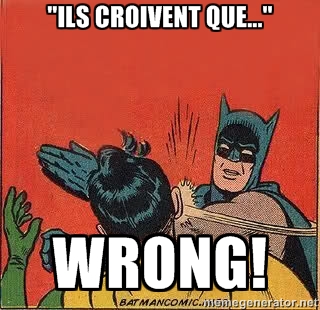You may have been learning French for a few weeks now. Or maybe you are just planning to start. Either way, you might be afraid of practicing your speaking skills; afraid of making mistakes.
But don’t worry! Many French speakers make (many) mistakes, too, so don’t be shy!
“Malgré que” is evil. Don’t use it. *
There are various ways to say “although” or “despite” in French. You can use either “bien que” or “malgré”, depending on specific grammatical criteria. But when you try to combine them and use them together as a single expression, you’re doing it wrong.
Examples:
- “Je m’amuse bien qu’il pleuve.” (Correct)
- “Je m’amuse malgré la pluie.” (Correct)
- “Je m’amuse malgré qu’il pleuve.” (Incorrect)
“Croiver” is not a verb. It does not exist. Ever!
Let’s spare a thought for one of the most damaged verbs in the French language: “croire” (to believe).
A bit of practice should be enough to learn the conjugation of this verb successfully:
- Je crois.
- Tu crois.
- Il croit.
- Nous croyons.
- Vous croyez.
- Ils croient.
However, some French people think that adding an extra “v” somewhere in there would be useful. But the fact is: it is not!
Examples:
- “Ils croient.” (Correct)
- “Ils croivent.” (Incorrect)

No “s” for me, thanks.
Sometimes, French people have that compelling urge to add an “s” at the end of some words.
One of the best examples is the word “parmi” (among), which gets a useless “s” added to it because of one of his friends, the word “hormis” (except).
The latter needs an “s” at the end, the former does not. Life is unfair sometimes…
Examples:
- “Je suis parmi vous.” (Correct)
- “Tout le monde hormis nous.” (Correct)
“Les si n’aiment pas les rais” (“Ifs” don’t like “rais”).
There’s so many people in France making this mistake that nowadays this rule has become a common expression in the French language.
It goes like this: You can’t use a verb in a conditional tense after the word “si” (if). Easy to remember, don’t you think?
Examples:
- “Si j’aurais su, je ne serais pas venu.” (Incorrect)
- “Si j’avais su, je ne serais pas venu.” (Correct)
The “gender traps”.
This may be one of the most difficult elements of the French language to learn: every word has a gender. How do you know if you should say “la chaise” or “le chaise”? Some rules and a lot of practice will definitely help you.
But some words are less common, and therefore not that easy. For example, the nouns “tentacule”, “haltère” and “entracte” are a common cause of headaches for many – even though they all are masculine!
Luckily, the word “après-midi” offers the best solution: It can be either masculine or feminine!
See? French is not always difficult!
Hopefully, now that we have highlighted these very common mistakes, they won’t be a problem for you at all!
And if you still have doubts, you can check out some of our grammar hints & tips on Lingvist!
* Actually, you can use it when followed by the verb “avoir” in the subjunctive tense, but it’s very rare.



